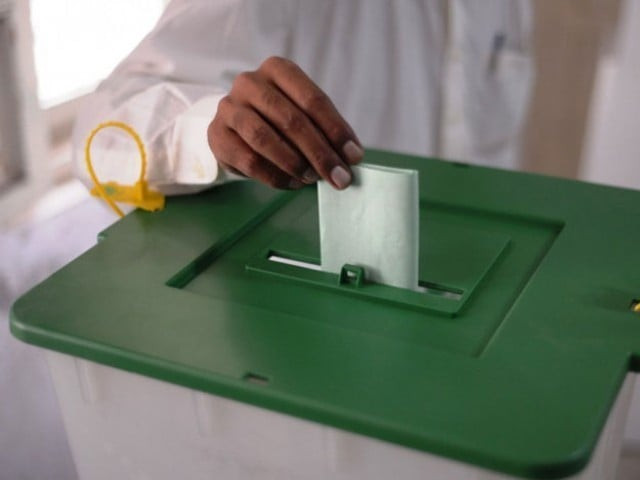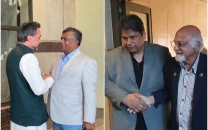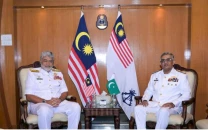Govt quietly changes capital’s election laws
Amendments through ordinance reduce women’s seats, change mayoral eligibility criteria, increase deputy mayor slots

PHOTO: AFP
The government has quietly introduced changes to the Islamabad Capital Territory (ICT) Local Government Act 2015 through an ordinance, potentially throwing the entire election into disarray.
The changes to the formation of the metropolitan corporation (MC) that will run city affairs have also been reflected in separate notifications issued by the Election Commission of Pakistan and the Ministry of Interior.
Twin cities ready for polls
Documents suggest that the ICT Local Government (Amendment) Ordinance, duly approved by the president, was notified on October 15 in the Gazette of Pakistan on a note initiated by the Interior Ministry.
Interestingly, the move was kept under wraps till Friday, as even party-backed candidates for the November 30 polls were unaware of the development.
According to the ordinance, the number of deputy mayors has increased from one to three.
Meanwhile, the ordinance has reduced the number of women’s seats in the MC by almost 50 per cent, while the eligibility criteria for the mayor and deputy mayors has also been changed.
Loopholes : Lacunas in local government polls addressed, court told
Women’s seats
The number of reserved seats for women in the MC has been reduced from 16 to nine.
After the polls at the 50 union councils of Islamabad, the 50 elected chairmen would form an electoral college for the selection of women members (33 percent of the electoral college), peasant and worker members (five per cent), technocrats (two per cent), youth and non-Muslim members (five per cent each) to form an MC.
The ICT Local Government Act 2015 says, “The number of women should not be less than 33 per cent [of the MC]”.
Based on 50 elected chairmen, women members should fill at least 16 seats, according to the act. But in the ordinance said clause of the Act has been omitted.
LG elections: Poll officials notified for Rawalpindi district
The Interior Ministry has notified formation of the MC in the light of the amendments introduced to the Act.
According to the notification, the 66-member MC will consist of the chairmen of all 50 UCs, nine women members, two peasant or worker members, one technocrat, two youth members, and two non-Muslim members.
Deputy mayors
The ICT Local Government Act 2015 provides that “The mayor and deputy mayor shall be elected as joint candidates in the first session of the MC from among 66 members.”
By introducing an amendment to section 17 of the act, the words “mayor and deputy mayor” have been replaced with “mayor and three deputy mayors”.
Local bodies elections: Returning officers, assistants appointed in Rawalpindi
The act provides that the deputy mayor should be elected from among the 66-member of the MC, but the ECP’s final notification says that all 650 members elected from all 50 UCs would be eligible for deputy mayor positions.
In the absence of the mayor, the senior-most deputy mayor would discharge duties as mayor.
Eligibility criteria for mayor
Likewise, the mayor of the MC was also supposed to be elected from among 66 elected persons, according to the ICT Local Government Act 2015.
Ordinance has also scrapped that clause and now the ECP’s notification issued on the basis of Ordinance says that all 650 elected members will be eligible to become mayor.
Court allows ECP to change election schedule
Problematic changes
PML-N leader Zafar Ali Shah said the government had introduced changes to the act through an ordinance approved by the president, which is in accordance with the law, as at the time of issue, the Senate and National Assembly were not in session.
“Through the ordinance, the clause referring to women’s representation percentage in the MC has been omitted,” Shah said.
PTI MNA Shireen Mazari termed the changes “unacceptable” and “illegal”, saying women form 51 per cent of the country’s population and it should reflect in decision making.
“The government has a bad habit of bulldozing parliament’s decisions using ordinances,” she said, adding that powers had still not been devolved in the true sense to local governments, and that sections of the Islamabad act had been amended without taking the opposition or even the ruling party’s allies in confidence. She said PTI would take up the issue in the National Assembly.
PPP Islamabad President Faisal Sakhi Butt said his party had not been taken into confidence while undertaking such “drastic changes” to the act. Butt said the government deliberately hid facts from other political parties and the masses so that the move could not be challenged in time. “PPP will challenge these changes at all available forums,” Butt added.
Published in The Express Tribune, November 28th, 2015.



















COMMENTS
Comments are moderated and generally will be posted if they are on-topic and not abusive.
For more information, please see our Comments FAQ